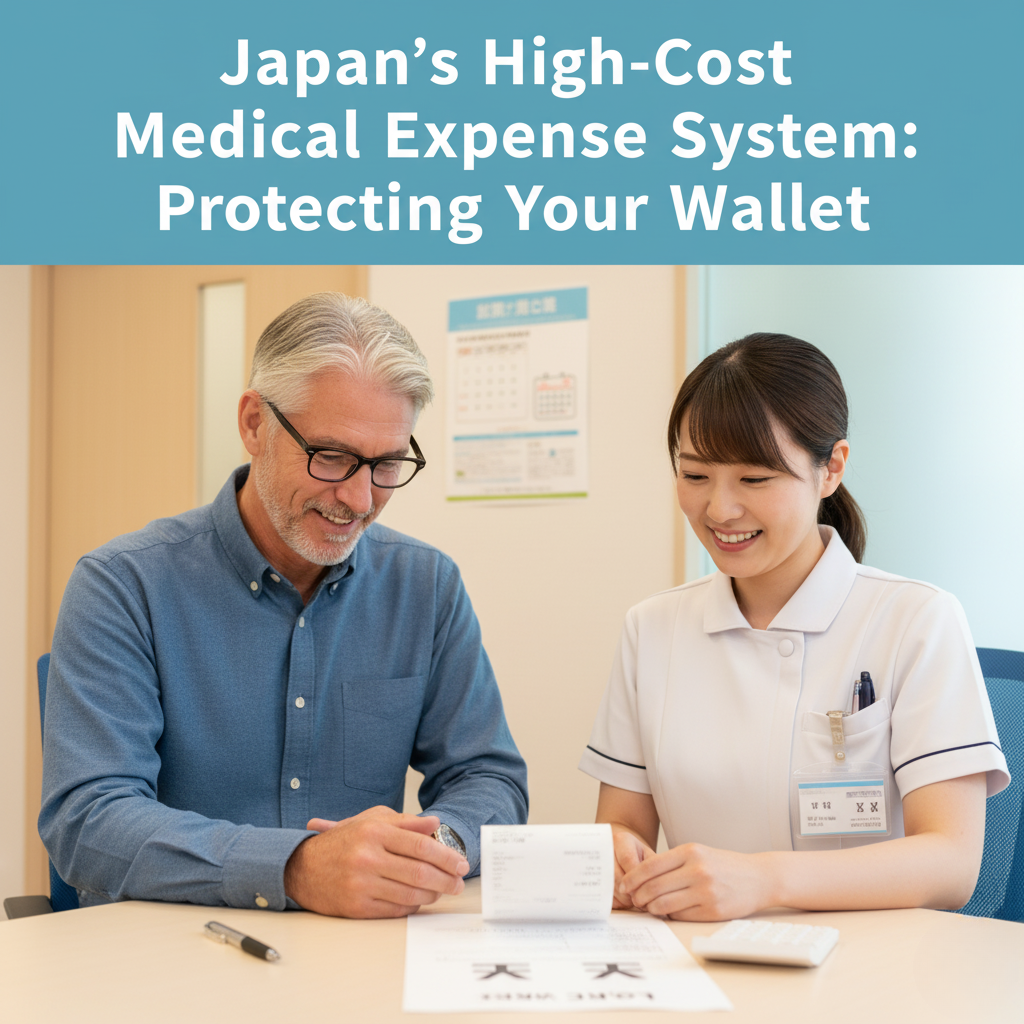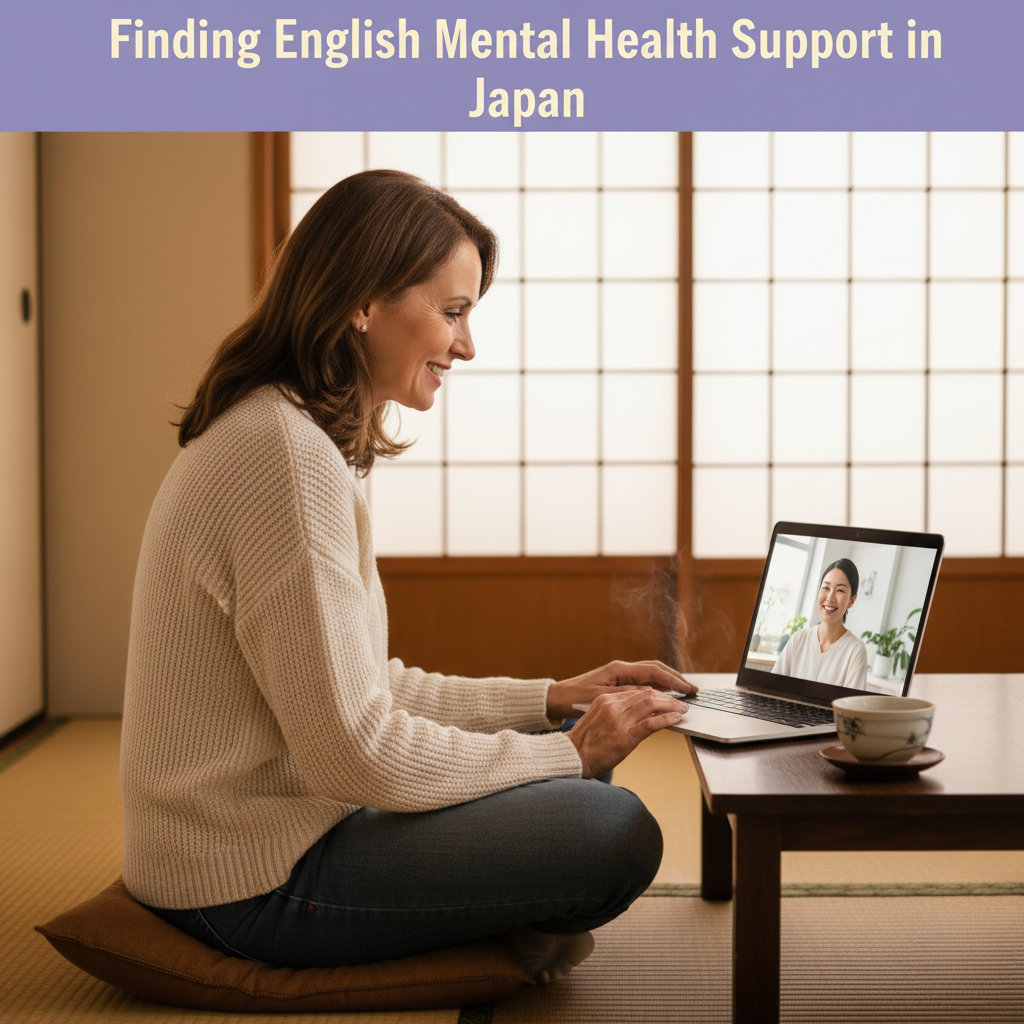
If you’re planning a move to Japan in your 40s, 50s, or even 60s, one of your biggest questions will likely be:“How does healthcare in Japan for foreigners actually work?”
I’ve experienced this firsthand, not just for myself but also while helping my foreign employees settle into life here. From standing in line at the city office to registering for insurance, I’ve watched their confusion turn into relief once that little green-and-white health card was finally in their hands.
To help you understand healthcare in Japan for foreigners, this section breaks down the public insurance system, its benefits, and what to expect.
This guide will walk you through:
- Japan’s healthcare system basics
- What insurance covers (and doesn’t)
- Costs and the High-Cost Medical Expense system
- Language barriers and English-speaking doctors
- Mental health care options for expats
- Real stories from midlife movers
I’ll also share one practical resource that many of my employees have used: Online-Therapy.com for English counseling support.
1. How Healthcare in Japan for Foreigners Works
Japan has a universal healthcare system. Almost everyone — including foreigners with long-term visas — must enroll in either:
- Employees’ Health Insurance (SHI / 社会保険 shakai hoken)
- Provided through employers.
- Premiums split between employee and employer.
- National Health Insurance (NHI / 国民健康保険 kokumin kenkō hoken)
- For freelancers, retirees, students, or dependents.
- You apply at your local city or ward office.
Understanding healthcare in Japan for foreigners is key to feeling confident before you move.
💡 Yes, you can move to Japan without an employer. As long as you have a valid visa (like student, dependent, or long-term resident), you can join NHI on your own.
2. Healthcare Costs in Japan for Foreigners
Here’s what you can expect:
| Expense | What You Pay | Notes |
|---|---|---|
| Insurance Premiums | Based on income & location | NHI is income-based; SHI is shared with employer. |
| Doctor Visits | ~30% of cost | A standard visit: ¥1,000–¥3,000 ($7–20). |
| Hospitalization | 30% capped by income | Big bills reduced via the High-Cost Medical Expense system. |
| Not Covered | Cosmetic surgery, some dental, private rooms | 100% out-of-pocket. |
📌 Official Info: Japan’s High-Cost Medical Expense System
One of my employees, David (60, U.S.), was amazed — a hospital stay that would have bankrupted him back home was capped to a manageable monthly amount here.
3. High-Cost Medical Expense System
This system is a lifesaver. If your monthly hospital bills exceed a certain threshold (based on age and income), the government refunds you the difference.
👉 That’s why many Japanese people skip private cancer insurance. Public insurance + high-cost protection already covers the worst scenarios.

4. Supplemental Health Insurance in Japan for Foreigners
Even though Japan’s public insurance is strong, some expats choose private plans for extras like:
- English support services
- Private hospital rooms
- Coverage while traveling back home
Options include Cigna, AXA, or GeoBlue. But for most midlife movers, a flexible global plan like SafetyWing or structured counseling like Online-Therapy.com is more relevant.
5. Healthcare in Japan for Foreigners: Language & Interpretation
If you’re in Tokyo, Osaka, or Nagoya, English-speaking doctors are common. In rural areas like Niigata (where I live), it’s harder.
Tips:
- Check embassy lists (e.g., US Embassy doctor list).
- Ask your city office — some offer interpretation services.
- Carry a translated medical history in Japanese.
💬 Linh (45, Vietnam) shared: “In Niigata, the hardest part wasn’t cost, it was language. My city hall helped me find an English-speaking nurse at a nearby hospital.”
🗣️ Language & Interpretation Services by Region in Japan
One of the biggest worries for midlife movers is: “What happens if I can’t explain myself to a doctor?” Luckily, many regions in Japan provide interpretation support for foreign residents.
🌸 Tokyo & Major Cities
- Tokyo Metropolitan Health & Medical Information Center (Himawari)
- 24/7 telephone service for foreign languages (English, Chinese, Korean, Thai, Spanish, etc.).
- Offers hospital referrals and interpretation by phone.
- Tokyo Himawari
- Osaka International House Foundation
- Offers medical interpreting and multilingual consultation services.
- I-House Osaka
🌾 Niigata (Regional Example)
- Niigata Medical Interpretation Center
- In-person interpreters in English, Chinese, and other languages.
- Approx. ¥3,000 + travel; booking ~2 weeks ahead recommended.
- Details from AJET Niigata
- Niigata International Exchange Foundation (NIEF)
- Hosts free medical consultation events with volunteer doctors and interpreters.
- NIEF Free Consultations
🏞️ Rural & Smaller Cities
- Many prefectural governments run International Exchange Associations.
- Example: Gunma, Fukuoka, and Nagano each have multilingual hotlines for residents.
- City halls often maintain lists of English-speaking doctors and volunteer interpreters.
- Embassies (U.S., U.K., Australia, etc.) publish regional hospital/doctor lists with English availability.
💡 Aya’s Tip
If you’re moving outside Tokyo or Osaka, check your prefecture’s “International Association” website. These groups often offer free or low-cost interpretation, especially for healthcare.
💬 For example, one of my employees in Niigata was introduced to an English-speaking nurse through her city office. It was a lifesaver when she needed care and couldn’t explain her symptoms in Japanese.
6. Healthcare in Japan for Foreigners: Steps Before & After Moving
If you’re preparing your move, reviewing details around healthcare in Japan for foreigners (like insurance, costs, and language support) will make everything smoother.
Before you move:
- Gather and translate medical records.
- Check if your current insurance covers abroad.
- Sign up for temporary coverage like SafetyWing.
After arrival:
- Register your address at the city office.
- Join NHI or SHI.
- Keep your insurance card with you.
- Find your local clinics.
7. Mental Healthcare in Japan for Foreigners
Mental healthcare in Japan for foreigners can be challenging, since insurance often doesn’t cover counseling.
This is an area where foreigners often struggle.
- Psychiatrists (medication): Covered by insurance.
- Therapy/counseling sessions: Often not covered.
- English-speaking therapists: Limited, mostly in big cities.
That’s why many expats turn to online therapy.
🌸 Aya’s Pick: Mental Health Support Anywhere
Finding English-speaking therapists in Japan can be difficult. That’s why I recommend Online-Therapy.com .
With Online-Therapy.com, you can:
- Connect with licensed therapists from anywhere.
- Use flexible formats: video, messaging, or chat.
- Access structured Cognitive Behavioral Therapy (CBT) tools like worksheets and journals.

💬 One of my employees used Online-Therapy.com after struggling to find English therapy locally. They told me the combination of worksheets and weekly check-ins really helped reduce anxiety during the adjustment period.
👉 Click here to explore Online-Therapy.com
8. True Experiences from People I Work With
- Marie (52, France): Relieved once her NHI card arrived, but relied on temporary coverage during her first month.
- David (60, U.S.): Praised the high-cost expense cap after hospitalization.
- Linh (45, Vietnam): Language was the hardest barrier, not cost.
These stories show that while the system works, being prepared makes the transition smoother.
9. Key Takeaways
- Japan’s NHI/SHI covers most healthcare costs.
- The High-Cost Medical Expense system protects against huge bills.
- Supplemental coverage is optional but useful for English support.
- Language can be a challenge, especially outside big cities.
- Mental health support is limited locally — online therapy fills the gap.
🌷 Warm Invitation
Moving to Japan in midlife is a bold step. Healthcare may seem complicated at first, but once you learn the system, it’s surprisingly affordable and reliable.
If you’re preparing your move, I’d love to hear your questions or experiences. Drop a comment or reach out — this community is here to support your journey. And if you need mental health support, you can explore my recommended option here: Online-Therapy.com.
Here’s to your healthy, fulfilling new life in Japan! 🌸


2 thoughts on “Healthcare in Japan for Foreigners: A Midlife Guide”
Greetings, Ayako. Thank you for your wonderful website! We are seniors in our 70s (74 and 77). We are wondering if moving to Japan at this point in our life is still possible. I am in good health and my husband has had a couple of heart issues, but recovered quickly and is doing well now. We are comfortable financially, but not wealthy.
Hello Pauline Tanaka,
Thank you so much for your kind words and for taking the time to read my blog! I’m so glad you found it helpful.
It sounds like you and your husband have a wonderful dream of retiring in Japan — and it’s a question I hear from many readers. While it’s not impossible, Japan doesn’t currently offer a standard “retirement visa.” The most common option is the Designated Activities Visa for long-term stays, which usually allows a 6-month stay, renewable up to one year.
To qualify, you typically need to show substantial savings (the guideline is often around ¥30 million JPY per couple) and proof of private medical insurance. It’s important to note that this visa is for temporary stays and doesn’t usually lead to permanent residency.
Regarding healthcare, this is a crucial point. Japan’s national system is excellent, but the Designated Activities visa mentioned above does not grant access to it. You would rely on your private insurance. The benefits I discuss in my blog, like National Health Insurance (NHI) covering pre-existing conditions, low co-payments for seniors, and Long-Term Care Insurance (Kaigo Hoken), are only available to those with long-term resident status (from other visa types, like work or spousal visas).
Because every case is unique, I strongly recommend speaking with a licensed immigration lawyer (行政書士 / gyoseishoshi) in Japan. They can provide guidance tailored to your specific situation and explain what’s possible under current rules — many offer online consultations in English.
Thank you again for reaching out. It takes courage to plan such a big move, and I truly wish you both the best as you research your next steps!
Warmly,
Ayako
Comments are closed.